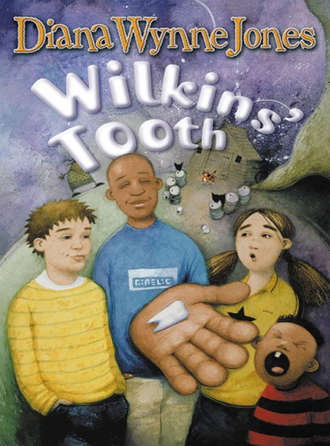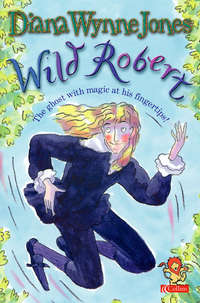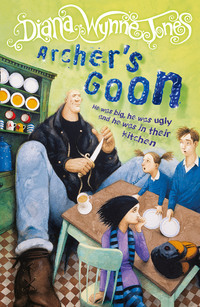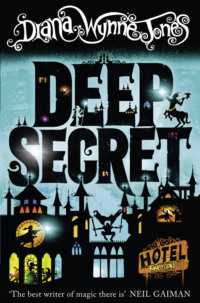
Полная версия
Wilkins’ Tooth
“Do you mean this notice?” asked the elder one.
“Yes,” said Jess. “Of course. You don’t think we put it up for fun, do you?” She was being rather haughty with them, partly because they were so peculiar, and partly because she was afraid they were going to make fun of Own Back like everyone else.
But the two little girls were in deadly earnest. The elder said: “And when you say difficult tasks, you mean that too?”
“Yes,” said Frank. “But the price goes up if it’s really difficult.”
They nodded. “This is,” said the elder, and Frank felt rather mean. They did not look as if they had much money. They wore funny patched aprons, like Victorian children, and their faces were thin and hungry. Their two pairs of big eyes stared at Frank and Jess like a picture of famine.
“What do you want us to do?” said Frank.
“Get us our Own Back,” said the elder.
“On Biddy Iremonger. She’s a witch,” said the younger.
“I don’t think she is,” said Jess. “Mummy says she’s just a poor old creature, and a bit wrong in the head.”
“Yes she is,” said the elder. “She put the Evil Eye on Jenny last summer, and Jenny’s foot’s been all wrong ever since.”
“The doctor says it’s nothing,” said Jenny, “but I can’t walk and she did it.”
“And,” said Frances, “if you can do her down, we’ve got a gold sovereign that belongs to us and we’ll give it you. Promise.”
Frank and Jess were both dismayed. The little girls stared so intensely – and the idea of a whole gold sovereign was overpowering. The worst part was how much they seemed to mean what they said.
Frank asked feebly, “What do you want done to her?”
“Anything,” said Frances.
“Everything,” said Jenny.
“Suppose,” said Jess, trying to be businesslike, “we get her and make her take it off Jenny. Would that do?”
They nodded fervently. “But if she won’t,” said Frances, “do something nasty to her instead. Very nasty.”
“All right,” said Frank. “If you want.”
“Thank you,” they both said and, before Jess could think to make further arrangements, they hurried away down the path. Frances pulled Jenny, and Jenny did indeed limp badly.
“Oh, dear!” said Jess, and then, after a moment, “It’s probably only rheumatism. Mummy always says how damp that house looks.”
“Jess,” said Frank, “we can’t go and – and do things to Biddy Iremonger, can we? Even if she is a witch.”
“But she’s not,” said Jess. “It’s just them. Biddy’s only funny in the head. And I don’t think we can take their sovereign anyway. It’s not money any longer, is it?”
“So what had we better do?” Frank said helplessly. “Go and talk to Biddy? It worked with Vernon.”
“I don’t know,” said Jess. “Maybe if Jenny thinks it’s Biddy, then if we can get Biddy to say she’s taken it off somehow, Jenny might feel better. Would that work?”
Someone else was reading their notice while Jess talked. Frank happened to look sideways, and saw a horse – or perhaps a pony – outside, with a boy on its back who was bending down to read the notice. “Except it wouldn’t be Own Back,” Frank said, watching to see if they had another customer. But it seemed they had not. The boy’s smart boots moved against the pony, and the pony went on past the window. Jess looked up, hearing the hooves. “Who was that?” Frank asked.
“That’s the boy from the big house,” said Jess. “Where the Wilkins’ work. I wish he’d stayed. Kate Matthews thinks he’s super. She’s always on about him.”
“He thinks he’s too super to come near us, then,” said Frank. “And that’s a pity, because I bet he’s got real money. Anyway, Jess, let’s try going to see Biddy, shall we?”
“All right. I suppose we’d better.”
Jess was just about to put up her AWAY notice, when they heard hooves clumping again, and the big shape of the pony filled the window. Jess hurriedly put down her notice and backed away. Both she and Frank held their breath, while the boy sat on the pony and did nothing. Then, when Frank was beginning to whisper that they might as well go, the boy reached out his riding crop and rapped it on the window.
“Hark at Lord Muck!” said Frank.
Jess backed right to the potting shed door, pulling Frank with her. “Oh, you go, Frank. I daren’t.”
“Then let go of me. Coming, my lord, coming!” said Frank.
“Frank! Don’t be silly!”
“Who’s silly?” said Frank, and tore himself free. He went to the window and opened it. “Yes?” he said, looking up at the boy and wondering what was so super about him. Nothing, Frank thought, but the boy’s own idea of himself. He was just a freckled boy with red hair and a haughty look.
“Are you Own Back?” asked the boy.
“Half of it,” said Frank. “The Limited half’s by the door.”
That, of course, made the boy bend down and peer into the shed, and brought Jess up beside Frank, very pink and swinging her hair angrily. “He means me,” she said, and gave Frank a sharp kick on the ankle to teach him a lesson.
“Then I’d like you two to do a job for me,” said the boy.
“What? Revenge-Difficult-Feat-or-Treasure-anything-to-oblige,” Frank gabbled in a way that was meant to be rude. Jess kicked him again.
The boy shifted about, as if he could see Frank did not like him. “Vernon told me about you,” he said. “If you must know.”
Jess glared at Frank, and Frank realised he had better be polite if they were ever to earn that five pence. “What was it?” he asked. “Some kind of Own Back?”
“Yes,” said the boy. “Actually.” His freckly face screwed into stormy lumps. “I want you to do something about those beastly Adams kids. I can’t stand them. And I don’t know what to do about them.”
“What?” said Jess. “You mean those two funny girls who live over there?” She pointed to the cheese-coloured house.
The boy looked. “I don’t know where they live,” he said. “If you’ve got them on your doorstep, I pity you. Frankie and Jenny Adams, they’re called, and one limps. And they drive me mad. They’re always round our house, calling names and saying it’s really their house. As if I could help living there! No matter what I’m doing, one of them bobs up and says it should be hers. And I’m not supposed to hit girls, for some reason, so I can’t stop them.”
“You want us to try to stop them?” asked Jess.
“At least go and call them names,” said the boy. “Show them what it feels like.”
Both Frank and Jess rather thought the Adams girls knew what it felt like, but they did not like to say so. Frank said, “Or something to teach them a lesson?” and the boy nodded. “And I think we’d charge ten pence,” said Frank, because that seemed reasonable.
The boy shifted again, until his pony stamped irritably. “I was afraid you might,” he said. “I’ll try and get it, but I’m a bit short, actually. I broke a greenhouse last week, and they stopped my pocket money. Couldn’t I give you something else instead? Exchange and barter? I’ve got a watch or a camera you could have.”
The Piries’ hearts sank. No money again. Not even a fellow feeling for someone else without pocket money prevented Jess from feeling a little cross with the boy.
“You should really have brought some money,” she said severely. “We don’t do it for goods. And we’ve both got watches.”
“I’ll try,” said the boy. “Maybe I’ll wangle some money. But I’d got desperate, actually, and when Vernon told me about you, I thought I’d see. Honestly, you don’t know what it’s like. They’re always there.” He did, to do him justice, look desperate, in a fretful sort of way.
“All right,” said Frank. “We’ll do it. On condition that you get us some money if you possibly can.”
“I’ll try,” said the boy. “Honestly. Shall I come back tomorrow, or do you need longer?”
“No. Tomorrow will do,” said Frank.
“Thanks,” said the boy, and he seemed genuinely grateful.
They watched him ride away down the path, scattering loose cinders with the pony’s feet, and they felt more than ever perplexed at the difficulties of Own Back.
“And it ought to have been so profitable!” said Jess. “What’s wrong?”
“I don’t know,” said Frank, “but I know this lets us off Biddy Iremonger. We can just go and tell those kids that we won’t do it because they shout after Lord Muck. What’s his real name?”
“Martin Taylor,” said Jess. “No, Frank, that’s not fair. They asked us first, and she does limp terribly. We’ll have to see them about him afterwards.”
“I can’t think,” said Frank, “why he doesn’t hit them secretly, even if he’s not supposed to. I would. And what’s she got to go and be called Frankie for? It’s so muddling.”
“Come on,” said Jess. “Let’s get it done before lunch. Then I vote we close.”
So they put up the AWAY notice once more and let themselves out of the back gate on to the allotment path. There was a strong wind. The sun shone bleak and bright, but not at all warm. Frank shivered. He told himself it was the wind and the old-cabbage smell the wind blew out of the allotments which made him shiver. But it was not. He was dreading Biddy Iremonger. And, to make matters worse, Mr Carter was digging on his allotment and called out to know if they had found the treasure yet.
“Take no notice,” said Jess, and with her nose stuck haughtily in the air, she pushed open the gate to the path that ran beside the allotments to the river.
The path took them down to the tangled, rusty fence on the river side of the allotments. It was the kind of fence nobody cared for. The parts of it that were not old, old barbed wire were made of bits of iron bedsteads, and it was held in place just by being overgrown with whitish, wintry grass and brambles. The path dwindled to a muddy rut where the fence met the wall, and squeezed its way up and round a loose piece of old bed. Frank and Jess squeezed with it, into the waste, white grass beside the river.
It was hot there – airless and smelly – because the big willow trees seemed to keep the wind off, and because it was low-lying. The river spread out secretly under all the white grass. If you walked off the path, you were in squelching, oily marsh. And it was full of rubbish – some of it buried under the grass, some of it thrown on top. There was a heap of tins beside the fence. A few steps further on, there was all that was left of an old bicycle sticking out from under the grass. The path went carefully round its front wheel. When Frank had been younger, he had thought this the most exciting place in the whole world. You never knew what you might find – motor tyres, mousetraps, buckets and bedsprings. But he was now too old to find it interesting. It depressed him instead. He particularly hated the muggy, sweetish smell in the place.
“Pooh!” said Jess. She marched on ahead, sending up musty smells from under her feet straight to Frank’s nose.
Biddy Iremonger’s hut was under a big hollow tree beyond a clump of brambles. It looked as if it might have been a boathouse once. It was wooden, and settled slopingly down the river bank. In front of it was a patch of bare earth, and heaped carefully round that were petrol drums and paint tins, to make a sort of wall. The path, as if it were scared at the sight, took a wide bend away from the hut and hurried, twisting, on to the footbridge over the river, just beyond. There was a sort of track leading to the hut, however, and Frank and Jess cautiously took it.
Biddy Iremonger’s black cockerel flew up to the roof of the hut when it saw them coming. The four black hens ran for shelter in a petrol drum. As soon as Jess set foot in the bare patch, Biddy’s cat leapt up, almost under her feet, and spat. It was a scrawny patchwork cat – ginger, tabby, black and white, all at once – and it seemed scared of everyone except Biddy. It ran away from Frank and Jess, crouching and cringing, to the doorway of the hut. There, it turned and spat again before it ran inside.
Frank and Jess, their nerve rather shaken by the cat, stood side by side in the bare patch, nearly overwhelmed by the hot, musty smell, which seemed worse than ever near the hut. Before they could think of what to do, Biddy Iremonger herself came slowly shambling out of the door of the hut and stood nodding at them cheerfully.
She was wearing at least three dirty sweaters and a skirt from a jumble sale, with sort of sacking trousers showing under the skirt. She had a sack round her shoulders too, like a shawl. Her hair, as usual, was put into at least six skinny plaits, which were looped up anyhow and held fast by curlers and paperclips. You could not see easily what her face was like – apart from its being very dirty – because she wore such enormously thick pebble-glasses. Her feet were in odd plimsolls, and her legs, below the sacking trousers, were bare and purple and swollen, so that her ankles drooped over her plimsolls. Jess was chiefly struck with how cold Biddy must be, living in a hut in all weathers. Frank just wished they could go away.
“Good morning,” said Biddy. “It’s nice to have some warmer weather, isn’t it?” She looked up at the branches of the willow tree, where powdery bright green buds were just beginning to show. “Yes,” she said. “We can allow it to be Spring before long, don’t you agree, my dears?”
Neither Frank nor Jess knew what to reply. The oddest thing about Biddy Iremonger was that she was educated. She had a sharp, learned voice, rather like Jess’s schoolteacher, which, when she spoke, made it very difficult to imagine her putting the Evil Eye on people – or, indeed, doing anything that was not just harmless and a little odd. So Jess and Frank nodded, and mumbled things about “nice day” and “no rain”, and Jess went on bravely to add, “There’s a bit of a wind, though.”
“Not down here,” said Biddy. “This little nook is beautifully sheltered.”
Then they all stood there without talking. The cockerel stalked to the edge of the roof and peered down at the Piries. The cat came slinking to the door and stared up. Biddy just waited, nodding, with a cheerful smile, as if she was sure they had just called to pass the time of day and would be going away any minute now.
Frank and Jess very nearly did go. It seemed such a shame to bother this poor, silly old lady because the Adams girls had got it into their heads that she was a witch. It was only Jess’s strong sense of fairness that kept them there. Jess took hold of Frank’s sleeve, took a deep breath of the muggy air, and said, “We’re sorry to bother you, Miss Iremonger, but we wanted to speak to you about – about Jenny Adams.”
“Oh, yes? What about her?” said Biddy, cheerfully and sharply.
“Well,” said Jess, feeling very silly, “she – er – she can’t walk, you know.”
Biddy shook her head at Jess and answered, quite kindly, “Now, my dear, that’s not really accurate, is it? She can walk quite well. I’ve seen her limping about rather nimbly, considering.”
Jess felt so foolish that she hung her head down and could not say a word. Frank had to clear his throat and reply. “Yes, we know,” he said. “But her foot’s bad all the same, and she says you put the Evil Eye on her.” He felt this was such a monstrous thing to say to Biddy that his face and his eyes – even his hands – became all hot and fat as he said it.
And Biddy nodded again. “Yes, my dear. She’s quite right. I did. I have it in for that family, you know.”
Jess’s head came up. Frank went suddenly from hot and fat to cold and thin with horror, that anyone could talk as calmly and cheerfully as Biddy about a thing like that. “Why?” he said.
“How unfair!” said Jess.
“Not at all,” said Biddy. “One has one’s reasons. I have to get my Own Back, you know.”
“But look here,” said Frank, “she’s only a little kid, and she’s had it for a year now. Couldn’t you take it off her?”
“Please,” Jess added.
Biddy, smiling and shaking her head, began shuffling back into her hut. “I’m sorry, my dears. It’s none of your business.”
“You’re wrong,” said Jess. “It is our business – exactly. Please take it off.”
Biddy stopped for a moment, in the doorway of her hut. “Then, if it is your business,” she said briskly, “I suggest you give me a wide berth, my dears. It would be wisest. Because, I assure you, Jenny Adams is not likely to walk freely until she has her heirloom in her hands. Which, in plain language, is Never. So I suggest you leave the matter there.”
Biddy shut the door of her hut in their faces with a brisk snap, and left Frank and Jess staring at one another.

Chapter 3
The first thing they did was to get themselves out of Biddy’s bare patch and back to the path again. There, halfway to the footbridge, Jess stopped.
“How awful!” she said. “How terrible! Oh, Frank, Biddy Iremonger must be quite, quite mad after all. She ought to be put in a Home.”
Frank did nothing but mumble. His skin was up in goose-pimples all over and he did not trust himself to speak. All he wanted to do was to go away quickly. He hurried on along the path towards the bridge.
Jess followed him, saying, “Of course, she may have been having us on. Mummy says she’s got a strange sense of humour.”
Frank again said nothing. It seemed plain enough to him that Biddy had meant what she said and, if Biddy believed herself to be a witch, he could hardly blame the Adams girls for thinking so too. Mad or not, it did not seem to matter. Perhaps witches were mad, anyway. What did matter was what they were going to tell Frankie and Jenny, because it looked as if Own Back had let them down. He was wondering just what they would say, when Jess grabbed at his arm.
“Oh, dear! Listen, Frank.”
There were voices, distant, but getting nearer, loud and crude, and the sound of wheels and sticks. Buster Knell and his gang were in the field on the other side of the river somewhere. Jess and Frank bundled along to where the bridge began. The river took a bend here, which allowed you to look up along the opposite bank. There, they could see the gang coming along the bank towards the bridge in a noisy group, about twenty yards above Biddy’s hut. They could hear, not clearly, orange and purple language.
Frank slid quickly down the bank beside the bridge, where there was a tiny beach of gravel. He was hidden there by a bush and some newly-sprouting flags, but he could see Buster and the gang. Jess hesitated, and then followed him. They crouched side by side, watching the gang come nearer.
“But it’s all right,” said Jess. “They’ll not dare lay a finger on you, Frank, after Wilkins’ tooth.”
“That’s what you think,” said Frank. “I’m not taking any chances.”
“They’ll come over the bridge, though,” said Jess. “Hadn’t we better go across first? Otherwise, they’ll be between us and the Adams’ house, and then we’ll have to go back past Biddy’s hut and I don’t think I can bear to.”
“Shut up,” said Frank. “I bet the Adams kids went past it. If they can, you can.”
“Between the Devil and the deep blue Buster,” said Jess. “Oh dear!”
To their intense relief, the gang turned aside when they were about ten yards off, and went calling and cursing and splashing down into the river. It seemed they were going to ford it. Maybe it was more manly or more exciting, or both, that way. Jess and Frank waited agonisingly, until the smallest boy, in the last go-cart, had been, with cursing and tremendous difficulty, lugged through the water and on to the bank out of sight. Then they stood up and sprinted over the bridge and out into the field beyond. Halfway to the bare, lonely Adams house, they looked back. The gang appeared not to have noticed them. They were milling about in the bushes and rubbish just above Biddy’s hut, and no one was looking their way. Rather nervously, Frank and Jess followed the path over to the peeling door in the side of the cheese-coloured house, and knocked.
The door was opened, after a lot of hollow-sounding treading about, by a thin, tall, vague-looking lady in a dangling smock. Jess at first thought the lady was covered with blood. Then she saw it was only paint. There was paint on the lady’s hands too – so much, that the lady did not seem to be able to touch the cigarette she had in her mouth. She talked round it, through puffs of smoke, and the cigarette wagged.
“What do you kids want, eh? No jobs going, I’m afraid. Bohemian household and all that.”
“Could we see Frankie and Jenny, please?” asked Jess.
“Oh, yes. Sure. This way.” The lady left the door open and simply walked away inside the house. Frank and Jess, a little doubtfully, stepped inside and followed her down a cold stone passage smelling of mildew and lamp oil. They could not tell which smell was the strongest. Jess thought mildew, and did not wonder that Jenny had rheumatism. Frank thought lamp oil. There seemed to be no electricity in the house.
The lady pushed open a door. “Frankie. Friends for you,” she said. Then, with her cigarette still untouched and wagging, she went off into another room. Before the door to it shut, Frank glimpsed an easel, with a painting on it.
The two little girls were in a small room that smelt, distinctly, more of mildew than of oil. There were toys about, so it must have been a playroom. But it was, Jess thought, almost as cheerless as the potting shed, and certainly as dark. The reason for the darkness was that outside the window stood a great wooden millwheel, so old that grass grew on it in clumps, and so big that very little light got past it into the room.
Frankie bounded to meet them looking so excited that Jess felt mean. “What happened? What did you do to her?”
“Nothing yet,” Jess said awkwardly.
Frankie just looked at her, with her great big famine-eyes. Jenny, who was crouched up on the windowsill, said, “I knew you wouldn’t. Nobody dares to.” She was not jeering. She just said it as a matter of fact, rather sadly. She made Frank feel terrible – even worse than Jess was feeling.
“This is – this is a sort of progress report,” he said. “We saw her, and she said she wouldn’t take it off you. That’s as far as we’ve got.”
Frankie leaned forward, with her eyes bigger than ever. “Then go on and do something awful to her. Now you know.”
“At least you didn’t let her deceive you,” said Jenny. “Lots of people won’t believe she’s a witch, but that’s just because she looks jolly and they think she’s joking.”
“But she isn’t joking,” said Frankie. “She’s wicked. Really.”
Somehow, now they had talked to Biddy, Jess and Frank found this easier to believe. Jess still knew, somewhere in the back of her head, that Biddy must simply be mad, but she did not know it strongly enough to say so. All she said was, “Yes, I know. She said she’s got it in for your family.”
Both little girls nodded. “Yes, she has,” Frankie said. “So now do something.”
“All right,” said Frank, “but—” he hesitated, and then said, in a rush, in a rather official-sounding voice, because he felt so mean—“but we’ve got to do it on conditions, because we can’t take your sovereign.”
The little girls stared. “Why not?” said Jenny. “It’s worth much more than a pound.”
Jess saw the point. She shook her head firmly. “It’s not legal tender,” she said. She was not quite sure what that meant, but she was sure it was the right phrase, and it sounded beautifully official. Frankie and Jenny were impressed by it, and stared mournfully at her.
“So we’ll do something to Biddy,” Frank went on pompously, although he was out in goose-pimples again at the mere idea, “if you promise us to stop calling names after – what’s his name, Jess?”









